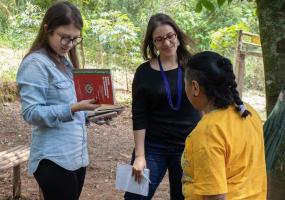“We are the dinosaurs”
24 Jan 2012
Laura Pekonen writes: Documentary filmmaker and producer Norma Percy spoke about making long-format documentaries at the RISJ seminar on 18th January 2012. Her new series "Putin, Russia and the West" began on January 19th on BBC2. She has previously made the award-winning documentaries 'The death of Yugoslavia', 'Iran and the West', and 'End of Empire', amongst others. Here is part of her talk: "What I have done for more than 30 years is show what it is like to be in the room where the big political decisions are made. Each documentary involves around three years of work. When we start, first we think about what the big decisions are. Sometimes it is surprisingly hard to identify them. Then we find out who was there and what happened. First we interview everyone off the record. It takes about a year of research before we actually film anything. We only film when we know what we want. So first we interview junior aides, last we approach the prime ministers. What I do is show how the decisions are made, not why they are made. I interview only those who took part in the top meetings, not academics or analysts. This sort of television presents evidence, it does not explain it. When I did my first series on Russia and Gorbachev, I interviewed a member of the Politburo and I said to him, 'tell it to me like when you came home and told your wife what happened'. And I could see the horror on his face at the thought that he would have told his wife what happened at the Politburo. Because we interview only a limited number of people, it is important we get them. If we don't, we have to rely on archives or pick some events and leave others out. That is why the archive research is important. When we did a series on Watergate, David Frost gave us an access to some of his interviews with Richard Nixon. Then in the Russian series Tony Blair was important. He was the first western leader to take Vladimir Putin seriously - he could see how influential he would become. But Blair wouldn’t give us the interview because he was now the Middle East envoy and has to work with the Quartet. So Blair was dropped out of the history, at least my history. So why do top politicians agree to take part? I am going to say something that is controversial: because they are reasonable men. Mostly they do things for the right reasons and they want history to understand them. All of them ask: who else is doing it? So if you can show them other people who were in the room giving an interview, they want to give their own version. And you have to persuade them it is going to be a big audience. It has to be worth it. Our series is broadcast all over the world so we have to convince them there is no British bias. We have to make it multi-sided. But there is one bias. People who get the most time are the people who are good storytellers. They are the winners. It is not often people tell totally different stories even if they may have opposite points of view. We don't allow people to look like liars. Only Slobodan Milosevic, because he didn't say anything that was true. Like 'genocide, what genocide?' I will tell you my secret. When I interview Bill Clinton I say 'imagine I am Yasser Arafat'. So don’t use third person but say, 'look, Yasser', like you said it to him. The thing is to make the leaders remember the moment. After all, Bill Clinton was the man who almost achieved peace in the Middle East – it's a big thing for him too. This all obviously takes a lot of time and money, too. The BBC pays half and the other broadcasting companies half. And it is a struggle to get it together. It may take half a year just to negotiate about the funding. The backbone of our work is to sit down and do these interviews. We really are the dinosaurs."



